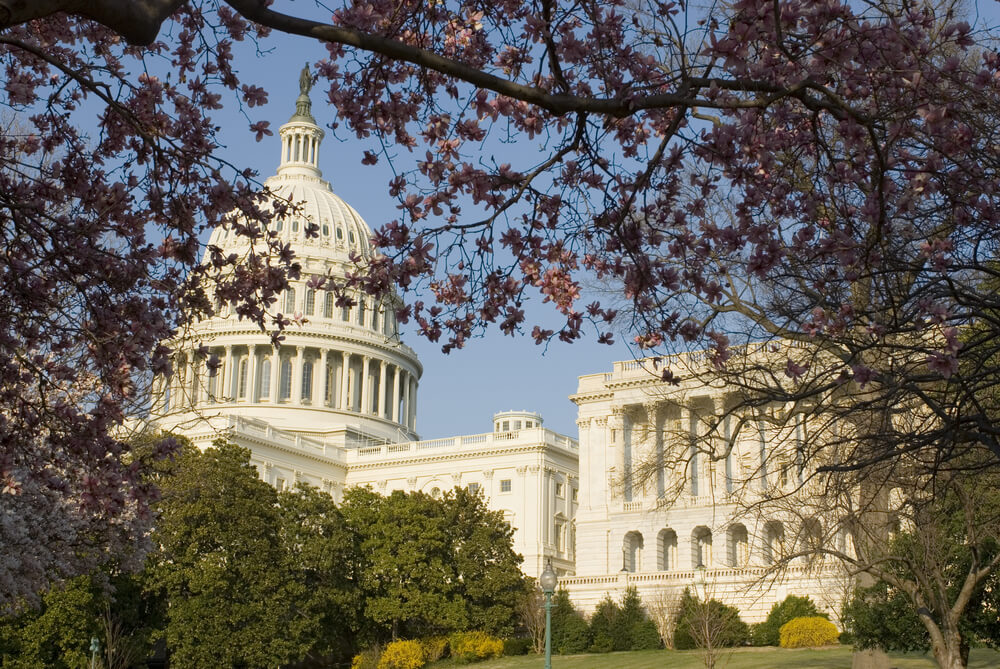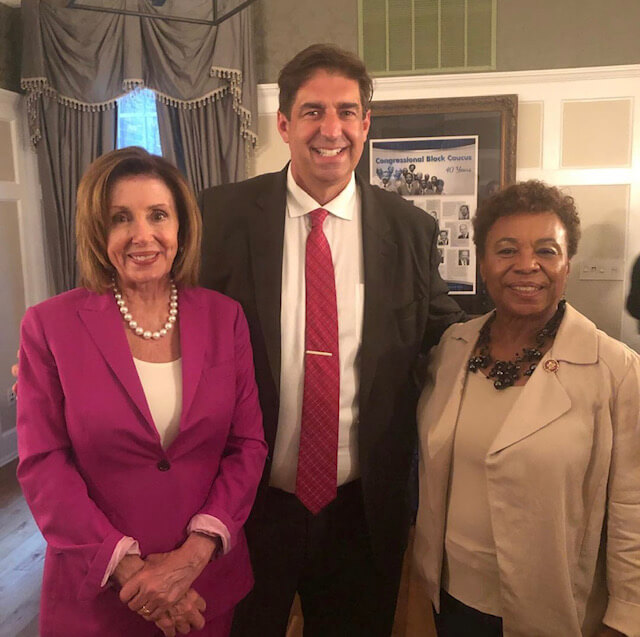From The Hill: The Emergency Cannabis Small Business Health and Safety Act

by Morgan Fox, NCIA’s Director of Media Relations
 Legislation to give legal marijuana businesses, which have been declared essential in a majority of states with regulated cannabis markets, access to resources being made available by congressional COVID-19 emergency response packages was introduced in the House of Representatives last week by Rep. Earl Blumenauer (D-OR) and Rep. Ed Perlmutter (D-CO).
Legislation to give legal marijuana businesses, which have been declared essential in a majority of states with regulated cannabis markets, access to resources being made available by congressional COVID-19 emergency response packages was introduced in the House of Representatives last week by Rep. Earl Blumenauer (D-OR) and Rep. Ed Perlmutter (D-CO).
The Emergency Cannabis Small Business Health and Safety Act would stop cannabis businesses and those that provide services to them from being excluded from further federal relief funding provided through the Small Business Administration (SBA).
Specifically, this bill would impact the following programs: Paycheck Protection Program (PPP), Economic Injury Disaster Loans (EIDL), and EIDL emergency grants. It would also protect SBA employees from prosecution for administering relief funds to cannabis businesses.
The full text of the bill is available here.
Under current policy, businesses that deal directly with cannabis production and sale, as well as many that provide services to them, are ineligible for most SBA programs. And the definition that the SBA uses to define which ancillary businesses are eligible is very vague. You can find a useful primer on federal relief eligibility from our friends at Vicente Sederberg LLP.
Let’s be clear: the fact that many cannabis businesses have been permitted to remain operating during this difficult time will not be enough to sustain the industry or allow for an effective and timely recovery once this nightmare is behind us. Lack of access to federal funds is just one of the many stressors facing cannabis businesses, which is why it is vital that we become eligible for relief as soon as possible.
Many indirect businesses have not been declared essential and have been forced to close. Cannabis businesses that have remained open must contend with declining sales, supply chain disruptions, onerous tax rates, lack of access to banking services, and the costs incurred by implementing additional health and safety measures to protect employees and customers.
Thankfully, the chorus of voices calling for fair access has been steadily growing. Earlier in April, Rep. Blumenauer and nearly three dozen of his colleagues sent a letter to House leadership urging them to make cannabis businesses eligible for SBA programs. Senators Jacky Rosen (D-NV) and Ron Wyden (D-OR) along with eight co-signers sent a similar letter to Senate leadership last week. They have been joined by cannabis industry advocates, the Marijuana Justice Coalition, the United Food and Commercial Workers International Union, state officials including Colorado Gov. Jared Polis, and others.
NCIA and our allies will continue to put pressure on Congress to treat cannabis businesses fairly during this crisis, but we need your help.
Please email and then call your congressional representatives today and ask them to support the legal (and essential) cannabis industry during this critical time. Talking points and instructions for calling your representatives are available on our website.
Email My Representative
Call My Representative
Here is a sample script you can use:
“Hi, I am calling/writing today to ask that you co-sponsor Congressmen Blumenauer and Perlmutter’s recently introduced Emergency Cannabis Small Business Health and Safety Act. This important piece of legislation would stop cannabis businesses and those that provide services to them from being excluded from further federal relief funding provided through the Small Business Administration. This current lack of access will undoubtedly lead to unnecessary layoffs, reduced hours, pay cuts, and furloughs for the workers of cannabis businesses who need support the most. As your constituent, I ask and urge that you sign on as a co-sponsor for this Act as soon as possible. Our industry, our businesses, and our employees cannot wait.”
The situation on Capitol Hill is extremely fluid as you might imagine. This bill could move forward as standalone legislation or could be incorporated into the next round of federal relief funds, which is being called CARES 2. Stay tuned for updates and be on the lookout for additional ways you can help us protect our essential industry.
Supporting Our Cannabis Champions

by Madeline Grant, NCIA Government Relations Manager
With all the action in the 116th Congress so far, NCIA strives to support as many cannabis champions on Capitol Hill as possible. It is key to keep Members of Congress that support cannabis reform in the halls of Congress, as they will continue to push the momentum forward through legislation, committee activity, and education. Our NCIA-PAC Leadership Circle members make this support possible, as their contributions go straight towards Members of Congress. Below are a few events and fundraisers where we utilized PAC funds to support our issues and Members on the Hill.

NCIA staff attended Congressman Ed Perlmutter’s fundraiser in celebration of the passage of the Secure and Fair Enforcement (SAFE) Banking Act on the House side. Rep. Perlmutter is the lead sponsor of the SAFE Banking Act and because of his leadership and hard work over the years, we are seeing more success this congress than ever before!

As we are approaching the Holiday season, Members of Congress are getting festive. NCIA hosted Congressman McNerny’s Holiday Party. Our D.C. staff is making use of our new office, as we’ve hosted a handful of holiday parties this year full of conversations, hot chocolate, and cookies for all.

Another festive holiday party hosted at our D.C. office with Congressman Earl Blumenauer. The Congressman gave everyone a mini fruit cake, a famous annual tradition in the Blumenauer office. With all the momentum this congress, Congressman Blumenauer has been one of our biggest champions in cannabis reform.

Mike and I attended Rep. Porter’s lunch fundraiser this year. It is always a pleasure discussing policy issues with the congresswoman. As a freshman Member of Congress, Rep. Porter has been fighting for the cannabis industry since day 1. We had the pleasure of meeting the Congresswoman when she entered into California’s 45th district race and continue to support her with NCIA’s PAC funds.

Our Director of Government Relations, Michael Correia, attended Rep. Lee’s birthday this past July. He was able to spend some time with Speaker Pelosi and Rep. Lee while discussing cannabis reform. As you know, the momentum in the 116th congress has been momentous so it’s important to thank the Members of Congress that helped make it happen.
How do we support our champions?
NCIA’s Political Action Committee (PAC) supports our champions on Capitol Hill. With NCIA-PAC funds we are able to contribute PAC dollars to the Members of Congress above and many more. These funds go to their campaigns to help them get reelected and stay to fight for us on Capitol Hill. If you are interested in learning more or getting involved with the NCIA-PAC, please send an email to Madeline@TheCannabisIndustry.org. Thank you to our PAC Leadership Circle members that help support cannabis reform on Capitol Hill- without you, we would not be able to support our champions.
A Closer Look at the “Flurry” of Cannabis Legislation in Congress
by Michael Correia, NCIA Director of Government Relations
Last week, we saw Congress introduce a flurry of marijuana related legislation, with many aspects directly affecting the cannabis industry.
Taking the lead on bill introductions were cannabis champions Rep. Earl Blumenauer and Sen. Ron Wyden of Oregon, who introduced a series of bi-cameral, bi-partisan bills that they referred to collectively as the ‘Path to Marijuana Reform’. In addition, the cannabis industry gained a new Republican champion – Rep. Carlos Curbelo of Florida. Rep. Curbelo is a member of the Ways and Means committee and is an original co-sponsor of the new legislation that aims to fix 280E. Their goal was to pave the way for regulation of cannabis at the federal level, and provide certainty in the 50 states. In addition, Colorado Congressman Jared Polis introduced his own stand-alone regulation bill.
Following is a summary of each bill:
H.R. 1810/S. 777, the Small Business Tax Equity Act of 2017:
This legislation would repeal the tax penalty that singles out state-legal marijuana businesses and bars them from claiming deductions and tax credits. Because marijuana is classified as a Schedule I drug, cannabis dispensaries operating legally under state law are prohibited from deducting normal business expenses from their net income on federal tax returns. In fact, many dispensaries have been forced to pay between 50 and 70 percent of their net income to the federal government. The lead sponsor is Republican Congressman Carlos Curbelo from Florida, who sits on the House Ways and Means Committee, the Committee of jurisdiction on tax bills. NCIA has been lobbying on this bill for years and is happy to have the Congressman help us navigate this bill through Congress.
H.R. 1824/S. 780, the Responsibly Addressing the Marijuana Policy Gap Act of 2017:
Congressional advocates say this bill reduces the conflict between state and federal law, without legalizing cannabis at the federal level. An all-encompassing bill, this legislation contains numerous sections addressing cannabis reform. Section 101 amends the Controlled Substances Act to exempt any person acting in compliance with state laws law from criminal penalties. Sections 201-207 address the 280E provision; makes exemptions for marijuana advertisements; allows access to banking services; allows access to bankruptcy relief; and allows tribal entities to pursue cannabis reform with fear of federal penalties. Sections 301-306 allow expungement of criminal records for certain marijuana-related offenses; limits marijuana drug testing for federal employment; excludes marijuana misdemeanors offenses from federal financial aid; limits federal civil forfeiture of state compliant marijuana businesses; limits immigrant deportation for marijuana related activity; and excludes marijuana related activity for federally assisted housing. Sections 401-403 lowers barriers to federal medical research of marijuana; authorizes Veterans Affairs doctors to allow recommendations for medical marijuana; and allows Indian Health Services to allow recommendations for medical marijuana.
H.R. 1823/S. 776, the Marijuana Revenue and Regulation Act:
This legislation would effectively legalize marijuana at the federal level by de-scheduling, taxing, and regulating marijuana. If passed, the Attorney General would have 60 days to remove marijuana from the Controlled Substances Act, but would still prohibit the transport of marijuana into any state in which it was still illegal under state law. Because of marijuana’s removal from the Controlled Substances Act, 280E would no longer apply to state-legal cannabis operators. In addition, this legislation would allow for a federal excise tax on marijuana. An excise tax of 10 percent would be in effect for the first two years after enactment. The rate would increase to 15 percent in the third year, 20 percent in the fourth year, and 25 percent thereafter. In addition, a $1000 per year occupational tax would be levied on each marijuana production facility.
H.R. 1841, the Regulate Marijuana Like Alcohol Act:
This bill, introduced by Colorado Congressman Jared Polis, would eliminate the federal ban on marijuana and establish a regulatory system that enables that choose to allow the use of marijuana without interference from the federal government. 60 days after enactment, marijuana would be removed from the Controlled Substances Act, but does not apply to interstate commerce. It would remove oversight from the DEA and move it to the Bureau of Alcohol, Tobacco, Firearms and Explosives; and would regulate marijuana like alcohol. It would establish a permitting system stemming from an annual licensing fee on marijuana producers. Finally, it would establish standards for advertising marijuana and its products.
—
With uncertainty still remaining related to potential Department of Justice enforcement, more and more advocates in Congress are coming out in support of our efforts. NCIA will continue pushing for reforms at the federal level and our friends on Capitol Hill won’t stop until your cannabis businesses are able to operate freely, like all other businesses.
NCIA member looking to help advance our issues on Capitol Hill should register for our 7th Annual Cannabis Industry Lobby Days coming up May 16 and 17 in Washington, D.C.

The 5 Critical Pieces of Cannabis Legislation You Need to Know About
by Michelle Rutter, Government Relations Coordinator
As the cannabis industry has continued to thrive and expand, the number of bills in Congress dealing with the issue has done the same. Between the House of Representatives and the Senate, there are well over a dozen bills that address the conflicts between state and federal cannabis policy. NCIA’s lobbying efforts focus primarily on banking access and the unfair taxation caused by Section 280E, but we also advocate for other bills that are crucial for the industry. Below are my choices for “The 5 Critical Pieces of Cannabis Legislation You Need to Know About”:
BANKING
H.R.2076: Marijuana Businesses Access to Banking Act of 2015
Introduced by: Rep. Ed Perlmutter (D-CO, 7th District)
Last Action: Referred to House Subcommittee on Crime, Terrorism, Homeland Security, and Investigations on June 1, 2015.
Summary: This bill would provide a safe harbor for depository institutions providing financial services to a cannabis-related business insofar as it prohibits a federal banking regulator from: (1) terminating or limiting the deposit or share insurance of a depository institution solely because it provides financial services to a marijuana-related legitimate business; or (2) prohibiting, penalizing, or otherwise discouraging a depository institution from offering such services.
S.1726: Marijuana Businesses Access to Banking Act of 2015
Introduced by: Sen. Jeff Merkley (D-OR)
Last Action: Read twice and referred to the Committee on Banking, Housing, and Urban Affairs on July 9, 2015.
Summary: Although the House and Senate cannabis banking bills are companions, the bill introduced by Sen. Merkley is slightly more detailed in its language.
The Senate bill would prevent federal banking regulators from: prohibiting, penalizing or discouraging a bank from providing financial services to a legitimate state-sanctioned and regulated marijuana business; terminating or limiting a bank’s federal deposit insurance solely because the bank is providing services to a state-sanctioned marijuana business; recommending or incentivizing a bank to halt or downgrade providing any kind of banking services to these businesses; or taking any action on a loan to an owner or operator of a marijuana-related business.
The bill also creates a safe harbor from criminal prosecution and liability and asset forfeiture for banks and their officers and employees who provide financial services to legitimate, state-sanctioned marijuana businesses, while maintaining banks’ right to choose not to offer those services. It would also require banks to comply with current Financial Crimes Enforcement Network (FinCEN) guidance, while at the same time allowing FinCEN guidance to be streamlined over time as states and the federal government adapt to legalized medicinal and recreational marijuana policies.
280E
H.R.1855: Small Business Tax Equity Act of 2015
Introduced by: Rep. Earl Blumenauer (D-OR, 3rd District)
Last Action: Referred to House Committee on Ways and Means on April 16, 2015.
Summary: Amends the Internal Revenue Code by adding language at the end of Section 280E that would exempt a trade or business that conducts marijuana sales in compliance with state law from the prohibition against allowing business-related tax credits or deductions for expenditures in connection with trafficking in controlled substances.
S.987: Small Business Tax Equity Act of 2015
Introduced by: Sen. Ron Wyden (D-OR)
Last Action: Referred to Senate Committee on Finance on April 16, 2015.
Summary: This Senate bill is the companion to the H.R. 1855 described above. As such, the summary is the same.
STATES’ RIGHTS AND RESPONSIBILITIES
H.R.1940: Respect State Marijuana Laws Act of 2015
Introduced by: Rep. Dana Rohrabacher (R-CA, 48th District)
Last Action: Referred to the House Subcommittee on Crime, Terrorism, Homeland Security, and Investigations on May 15, 2015.
Summary: Amends the Controlled Substances Act to provide that the provisions of the Act related to cannabis shall not apply to any person acting in compliance with state laws relating to the production, possession, distribution, dispensation, administration, or delivery of marijuana
CIVIL ASSET FORFEITURE
H.R.3518: Stop Civil Asset Forfeiture Funding for Marijuana Suppression Act of 2015
Introduced by: Rep. Ted Lieu (D-CA, 33rd District)
Last Action: Referred to the House Subcommittee on Crime, Terrorism, Homeland Security, and Investigations on October 5, 2015.
Summary: This bill would prevent the Drug Enforcement Administration (DEA) from using federal forfeiture funds to pay for its Domestic Cannabis Eradication/Suppression Program. Additionally, the bill would ban transferring property to federal, state or local agencies if that property “is used for any purpose pertaining to” the DEA’s marijuana eradication program.
MEDICAL CANNABIS
S.683: Compassionate Access, Research Expansion, and Respect States (CARERS) Act of 2015
Introduced by: Sen. Cory Booker (D-NJ)
Last Action: Referred to Senate Committee on the Judiciary on March 10, 2015.
Summary: Amends the Controlled Substances Act (CSA) to provide that control and enforcement provisions of such Act relating to marijuana shall not apply to any person acting in compliance with state law relating to the production, possession, distribution, dispensation, administration, laboratory testing, or delivery of medical marijuana.
Transfers marijuana from schedule I to schedule II of the CSA.
Excludes “cannabidiol” from the definition of “marijuana” and defines it separately as the substance cannabidiol, as derived from marijuana or the synthetic formulation, that contains not greater than 0.3% delta-9-tetrahydrocannabinol on a dry weight basis.
Prohibits a federal banking regulator from: (1) terminating or limiting the deposit insurance of a depository institution solely because it provides or has provided financial services to a marijuana-related legitimate business; or (2) prohibiting, penalizing, or otherwise discouraging a depository institution from providing financial services to a marijuana-related legitimate business.
Provides depository institutions that provide financial services to a marijuana-related legitimate business protection under federal law from federal criminal prosecution or investigation, criminal penalties, and forfeiture of legal interest in collateral solely for providing financial services to such a business.
Directs The Department of Health and Human Services to terminate the Public Health Service interdisciplinary review process described in the guidance entitled “Guidance on Procedures for the Provision of marijuana for Medical Research” (issued on May 21, 1999), and also demands the Drug Enforcement Administration to issue at least three licenses under CSA registration requirements to manufacture marijuana and marijuana-derivatives for research approved by the Food and Drug Administration. Also directs the Department of Veterans Affairs (VA) to authorize VA health care providers to provide veterans with recommendations and opinions regarding participation in state marijuana programs.
H.R.1538: Compassionate Access, Research Expansion, and Respect States (CARERS) Act of 2015
Introduced by: Rep. Steve Cohen (D, TN-9)
Last Action: Referred to the House Subcommittee on Crime, Terrorism, Homeland Security, and Investigations on April 21, 2015.
Summary: This House bill is the companion to S. 683 described above. As such, the summary is the same.
In addition to these crucial pieces of legislation, there are other bills relating to cannabis that have been introduced to Congress on issues like CBD, a federal excise tax on cannabis, veterans’ access, and hemp. Cannabis advocates and NCIA members should continue to participate in NCIA’s events and lobbying efforts in addition to contacting their elected officials in order to see cannabis continue to progress in Washington, D.C. and on Capitol Hill.

 Legislation to give legal marijuana businesses, which have been declared essential in a majority of states with regulated cannabis markets, access to resources being made available by congressional COVID-19 emergency response packages was introduced in the House of Representatives last week by Rep. Earl Blumenauer (D-OR) and Rep. Ed Perlmutter (D-CO).
Legislation to give legal marijuana businesses, which have been declared essential in a majority of states with regulated cannabis markets, access to resources being made available by congressional COVID-19 emergency response packages was introduced in the House of Representatives last week by Rep. Earl Blumenauer (D-OR) and Rep. Ed Perlmutter (D-CO). 





